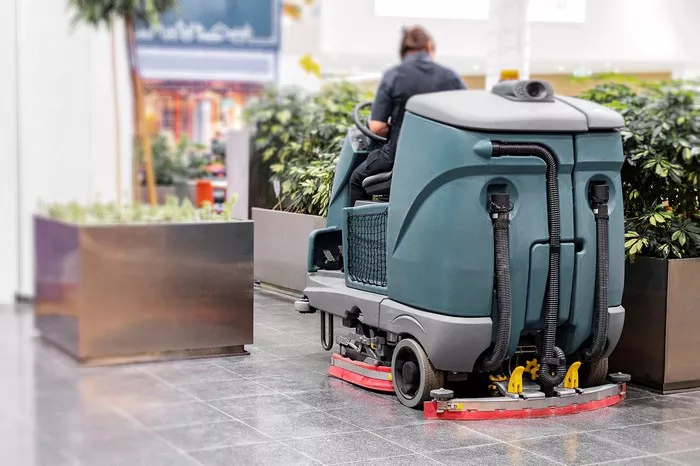Floor scrubbers are essential cleaning machines for maintaining cleanliness in various settings, from homes to commercial spaces. One crucial component of a floor scrubber is the squeegee. This part is responsible for collecting dirty water and ensuring a clean, dry floor after scrubbing. Proper adjustment of the squeegee is vital for optimal performance. In this article, we will explore how to adjust the squeegee on a floor scrubber effectively.
Understanding the Squeegee
What Is a Squeegee?
A squeegee is a rubber blade attached to the rear of a floor scrubber. It is designed to pick up excess water and cleaning solution from the floor after scrubbing. The squeegee ensures that the surface is left clean and dry, reducing slip hazards. An improperly adjusted squeegee can lead to water streaks, increased drying times, and potentially unsafe conditions.
Why Adjusting the Squeegee Matters
Correctly adjusting the squeegee affects the efficiency of the floor scrubber. A well-adjusted squeegee will ensure that water is effectively removed from the floor, preventing puddles and residue. This adjustment can also prolong the life of the squeegee blade and enhance the overall cleaning performance of the machine.
Tools Needed for Adjustment
Before starting the adjustment process, gather the necessary tools. Most adjustments can be made with basic tools commonly found in any maintenance toolbox. You will need a screwdriver, a wrench, and a level to ensure accurate adjustment. Having these tools ready will make the process smoother and more efficient.
Identifying the Right Squeegee Position
Check the Current Position
Begin by inspecting the current position of the squeegee. It should be level with the floor and aligned with the path of the floor scrubber. If you notice uneven wear on the squeegee blade, it may indicate that the squeegee is not positioned correctly.
Look for Signs of Improper Adjustment
Signs of an improperly adjusted squeegee include:
- Excessive water left on the floor
- Streaks or lines where water was not picked up
- Uneven wear on the squeegee blade
- Increased cleaning time due to redoing areas
Recognizing these signs early can save time and effort in your cleaning process.
Steps to Adjust the Squeegee
Step 1: Power Down the Machine
Before making any adjustments, ensure the floor scrubber is powered down and unplugged. This safety precaution will prevent any accidental starts while you are working on the machine.
Step 2: Locate the Squeegee Adjustment Mechanism
Next, locate the adjustment mechanism for the squeegee. This is typically found at the rear of the floor scrubber. Different models may have various designs, so refer to the manufacturer’s manual if you are unsure where to look.
Step 3: Adjust the Height
Most floor scrubbers allow you to adjust the height of the squeegee. The ideal height should allow the squeegee blade to make even contact with the floor surface. Use a wrench or screwdriver to make the necessary adjustments. If the squeegee is too high, it will not pick up water effectively. Conversely, if it is too low, it may cause excessive wear on the squeegee blade.
Step 4: Level the Squeegee
Once you have adjusted the height, ensure that the squeegee is level. Use a level tool to check the alignment. A level squeegee will provide the best suction and water pick-up. Adjust the squeegee on one side or the other as needed until it is perfectly level.
Step 5: Check the Angle of the Squeegee
The angle of the squeegee also affects its performance. The squeegee should be angled slightly towards the direction of travel. This positioning allows the water to flow toward the squeegee instead of away from it. Adjust the angle using the appropriate adjustment mechanism, ensuring that the blade maintains contact with the floor surface.
Step 6: Test the Adjustment
After making the necessary adjustments, it is essential to test the floor scrubber. Fill the tank with water and cleaning solution. Run the scrubber over a section of the floor. Observe how well the squeegee picks up the water. If you still notice excess water left on the floor, you may need to make additional adjustments.
Step 7: Inspect the Squeegee Blade
While adjusting the squeegee, take the opportunity to inspect the squeegee blade itself. Look for signs of wear or damage. If the blade is worn down or cracked, it will not perform optimally, even if adjusted correctly. Replace the squeegee blade if necessary to ensure effective water pick-up.
Maintaining the Squeegee
Regular Cleaning
After each use, clean the squeegee to remove dirt and debris. This maintenance prevents buildup that can impair its function. Wipe down the squeegee blade with a clean cloth to keep it in good condition.
Periodic Adjustments
Over time, the squeegee may require periodic adjustments due to wear and tear or changes in floor surface. Regularly check the adjustment settings to ensure optimal performance. Making adjustments as needed will help maintain the efficiency of the floor scrubber.
Replacing the Squeegee Blade
Squeegee blades will wear out over time, especially with frequent use. It is advisable to replace the squeegee blade every few months, depending on usage. Regular replacement will ensure the floor scrubber continues to perform at its best.
Conclusion
Adjusting the squeegee on a floor scrubber is crucial for achieving optimal cleaning performance. Proper adjustment ensures that water is effectively removed from the floor, resulting in a cleaner and safer environment. By following the steps outlined in this article, you can easily adjust the squeegee on your floor scrubber for maximum efficiency. Regular maintenance, cleaning, and replacement of the squeegee blade will further enhance the performance of your floor scrubber, allowing you to maintain a pristine floor with ease. Whether you are managing a commercial cleaning operation or maintaining a home, understanding how to adjust the squeegee can make a significant difference in your cleaning efforts.
Related topics:

